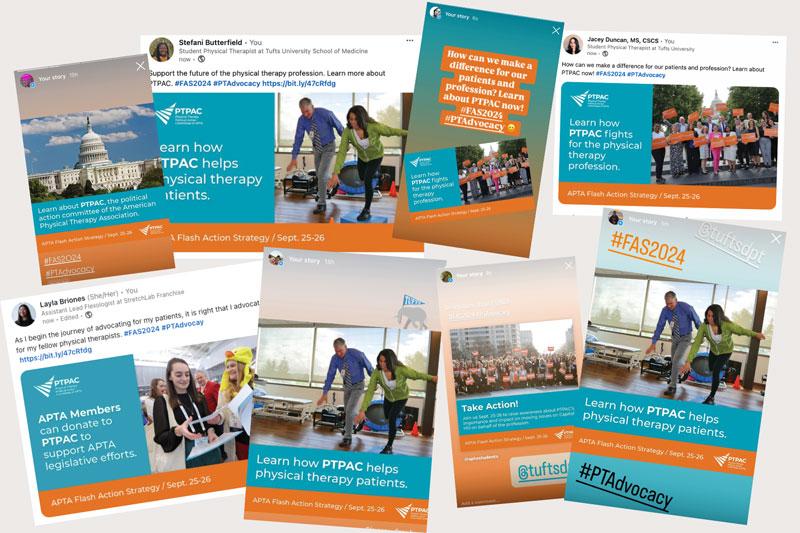-
About
- Departments & Offices
-
Academics
- Public Health
- Biomedical Sciences
- Physician Assistant
- Special Master’s (MBS)
-
Admissions & Financial Aid
- Tuition & Fees
-
Student Experience
-
- Student Resources by Program
- Academic & Student Support
- Wellness & Wellbeing
- Student Life
- Events & Traditions
-
-
Research
- Research Labs & Centers
- Tufts University-Tufts Medicine Research Enterprise
-
Local & Global Engagement
- Pathway & Enrichment Programs
- Global Health Programs
- Community Engagement
Empowering Physical Therapy Students: Advocacy for Diversity and Debt Relief
Tufts DPT-Phoenix Participation in the American Physical Therapy Association’s Flash Action Strategy.

In September, Jeffrey Foucrier, PT, DPT, OCS, assistant professor in the Doctor of Physical Therapy (DPT) Phoenix Program and Eric Vlahos, DPT26, student in the program, attended the American Physical Therapy Association (APTA)’s Flash Action Strategy (FAS). This annual advocacy initiative encourages DPT students and professionals in the United States to champion critical issues impacting the profession.
Focus on Key Advocacy Issues
The September event centered on key advocacy matters, including improving workforce diversity and addressing the growing burden of student debt.
DPT students were encouraged to engage lawmakers on Capitol Hill and promote these initiatives on social media. They used prepared advocacy materials from APTA along with personalized messages.
The event aimed to educate policymakers about the importance of these issues and to encourage legislative action that would benefit both physical therapy professionals and their patients.
“FAS offers students an opportunity to apply the principles of teamwork and advocacy as part of patient-centered care, with the intent of ensuring access to high-quality care and improving the health and well-being of diverse populations,” said Foucrier. “The intent behind this is to develop well-rounded healthcare professionals who not only excel in clinical practice but are also equipped to lead meaningful change within the profession.”
“Coming into the program, I wanted to take a more active role and find ways that I can help promote the role of Physical Therapy in my community,” said Vlahos. “The Flash Action Strategy opened my eyes to various possibilities to get involved in the profession while still balancing the responsibilities of school.”
Advocacy is a core emphasis in Tufts DPT programs, which aim to prepare students to be patient-centered clinicians and active advocates for both the profession and society at large.
“Participating in the FAS is a natural extension of our mission,” said Foucrier. “As a part of our professional competencies, Tufts DPT programs work hard to foster strong commitments to social responsibility by emphasizing social, economic, and legislative factors that impact healthcare delivery in our lived communities.”
Addressing Health Equity and Diversity and Finding a Voice Through Advocacy
The physical therapy profession faces challenges that affect students’ experiences, career opportunities, and the communities they serve.
Foucrier identified two key issues: the burden of student debt and the lack of diversity in the profession.
Efforts like the FAS aim to push for legislative changes that could alleviate this financial burden, potentially through loan forgiveness programs and increased federal funding for healthcare education.
The second critical issue is the lack of diversity in the physical therapy field. Current students and future professionals are advocating for legislation that promotes greater access to physical therapy education for underrepresented groups, ensuring the profession reflects the diverse populations it serves.
“Ultimately, I want to promote an agency in DPT students to become directly involved in shaping the future of their profession—effectively giving them a voice.” Added Foucrier. “I believe that by advocating for solutions to these issues that these students will not only positively impact their personal futures, but also generally affect the quality-of-care PT professionals can provide to our communities.”
“The Flash Action Strategy offers a multitude of opportunities and addresses issues in the field that allow us to have a seat at the table and make our voices heard,” said Vlahos. “That was what ultimately stood out to me. Through opportunities like the Flash Action Strategy, I feel that working alongside other students, therapists, and local legislators can help address critical issues within the profession, both as a student and as a future clinician.”
Related Links:
DPT Programs
DPT Student Stories